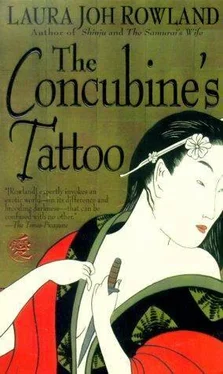Seething inside, Hirata continued, “I bet you’re pretty pleased with the way things turned out. But hear this: I know what you are-a murderess in spirit if not in fact. And I’m warning you: Cause trouble again, and I’ll come after you. Then you’ll get the punishment you deserve.”
“Punishment?” Lady Ichiteru gave a disdainful laugh. “What can you do to me that’s worse than the future that already lies ahead?”
She turned; her veil slipped. Hirata stared in shock. Ichiteru wore no makeup. Her eyes were red and puffy from weeping, her pale lips bloated. Her bare skin looked mottled and sallow, and she wore her hair in an untidy knot devoid of ornaments. Hirata barely recognized this plain figure as the woman who had captivated him.
“What happened to you?” he said.
“Tomorrow, fifteen new concubines arrive in the Large Interior. I was just informed that I am one of the women who will be dismissed to make room for them-three months short of my official retirement date!” Lady Ichiteru’s voice shook with fury. “I’ve lost my chance to bear the shogun an heir and become his consort. I shall return to Kyōto with nothing to show for thirteen years of degradation and pain. I’ll spend the rest of my life as an impoverished spinster, a despised symbol of the imperial family’s failed hopes for a restoration to glory.”
Sneering at Hirata, Lady Ichiteru said, “I apologize for what I did to you, but you’ll get over it. And whenever you think of me, you can laugh!”
Hirata’s need for vengeance dissolved. His attraction to Ichiteru had vanished with the artificial trappings of fashion and manner; her bitterness repelled him. Finally he could forgive and even pity Ichiteru. Her fate was indeed her punishment. His own concerns seemed trivial in comparison.
“I’m sorry,” he said.
He would have wished her luck, or offered polite words of comfort, but Lady Ichiteru turned away. “Leave me.”
“Good-bye, then,” Hirata said.
Walking back through the garden, he felt years older than when he’d begun the investigation. The experience had fostered wisdom. Never again would he allow a murder suspect to manipulate him. Yet the departure of the strong emotions he’d had toward Ichiteru left a vacancy in his spirit. He should attend to other cases before Sano’s wedding banquet, scheduled for that evening, but Hirata was too restless for work. Filled with vague yearnings, he entered the forest preserve, hoping that a solitary stroll would clear his mind.
He’d no sooner started down a path when a hesitant voice spoke behind him. “Hello, Hirata-san.”
Turning, he saw Midori approaching. “Hello,” he said.
“I took the liberty of following you from the herb garden because I thought-I hoped-you might like company.” Blushing, Midori fidgeted with a lock of her hair. “I’ll go away if you don’t want me.”
“No, no. I’d be grateful for your company,” Hirata said, meaning it.
They wandered between birches that dropped golden leaves upon them. For the first time since they’d met, Hirata really looked at her. He saw the beauty in her clear, direct gaze, her guileless behavior. He could understand his infatuation with Lady Ichiteru as a sickness that had blinded him to good things, including Midori. Thinking about the conversations he’d enjoyed with her, Hirata remembered something.
“You knew that Ichiteru tried to kill Harume last summer, didn’t you?” he said. “And you tried to warn me that she planned to use me to make sure she would never be arrested for the murder.”
Hiding her face behind the shiny curtain of her hair, Midori looked at the ground. “I wasn’t sure, but I suspected… And I didn’t want her to hurt you.”
“Then why didn’t you say so? I know I must not have seemed very eager to listen, but you could have spoken up, or written me a letter, or told the sōsakan-sama.”
“I was too afraid,” Midori said unhappily. “You admire her so. I thought that if I said anything bad about her, you’d think I was lying. You’d hate me.”
That a highborn girl could not only care about him, but also want him to think well of her, amazed Hirata. Now he realized that she’d liked him all along. She didn’t care about his humble origins. Midori’s honest tribute lifted him free of the prison of insecurity. It no longer mattered that he lacked noble lineage or cultured elegance. His life’s achievements-the true manifestations of honor-would suffice. Hirata suddenly wanted to laugh with exultation. How strange that his most humiliating experience should also bring the gift of revelation!
Touching Midori’s shoulder, he turned her to face him. “I don’t admire Lady Ichiteru anymore,” he said. “And I could never hate you.”
Midori regarded him with wide, solemn eyes full of dawning hope. A smile trembled on her lips; her dimples flashed shyly, like sunlight glinting on pearls under water. Hirata felt a spring of happiness as he saw a possible answer to his longing.
“What are you going to do now that Ichiteru is leaving?” he asked.
“Oh, I’ll be lady-in-waiting to one of the other concubines,” said Midori. She added, “I’m supposed to stay at Edo Castle until I marry.”
Or perhaps even afterward, Hirata thought, if he remained stationed here and their fortunes coincided. But that was rushing things. For now, he was satisfied to know they would both be at the castle long enough for the future to unfold.
“Well,” Hirata said, grinning. “I’m glad to hear that.”
Midori gave him a radiant smile. Sleeves touching, they continued along the path together.
“It is my pleasure to open the celebration of the marriage of Sōsakan Sano Ichirō and Lady Ueda Reiko,” announced Noguchi Motoori.
The go-between and his wife knelt upon the dais in the reception hall of Sano’s mansion. Beside them, Sano and Reiko, dressed in formal silk kimonos, sat beneath a huge paper umbrella, symbol of lovers. Wall partitions had been removed, expanding the room to accommodate three hundred banquet guests-friends and relatives, Sano’s colleagues, superiors, and subordinates, representatives of prominent daimyo clans. Glowing lanterns hung from the ceiling; the atmosphere shimmered with the scents of perfume, tobacco smoke, incense, and cooking.
“Like rain after a drought, these festivities are much delayed and therefore all the more welcome,” Noguchi said. “Now I invite you to join me in congratulating the bridal couple, and wishing them a long, happy life together.”
Musicians played a cheerful melody on samisen, flute, and drum. Servants passed out sake decanters and cups, proffered laden trays of delicacies. Cries of “Kanpai!” arose from the guests. His heart brimming with joy, Sano exchanged smiles with Reiko.
The murder investigation was over, albeit not as comfortably as he would have liked. The violent deaths of Lord and Lady Miyagi still disturbed him. Lieutenant Kushida had been transferred to a post in Kaga Province, where he might or might not recover from his obsession and build a new life. Also, Sano felt that he should have guessed that Chamberlain Yanagisawa would sacrifice Shichisaburō, and somehow saved the actor.
However, there would be plenty of time later to review the case, to apply the experience toward better results in future. Relative harmony had returned to Edo Castle. Tonight offered a happy respite from agonizing over the past. How much more significant this celebration was now than if it had taken place right after the wedding! To Sano it seemed a fitting tribute to the bond forged between him and his bride during the investigation. Under cover of their flowing sleeves, they clasped hands.
Magistrate Ueda stood and made the first speech. “Marriage resembles the joining of two streams-two families, two spirits coming together. Though turbulence often results when the waters mix, may they continue to flow forever in the same direction, two forces united for mutual benefit.” Beaming proudly at Sano and Reiko, the magistrate raised his sake cup. “I toast the allegiance between our two clans.”
Читать дальше












